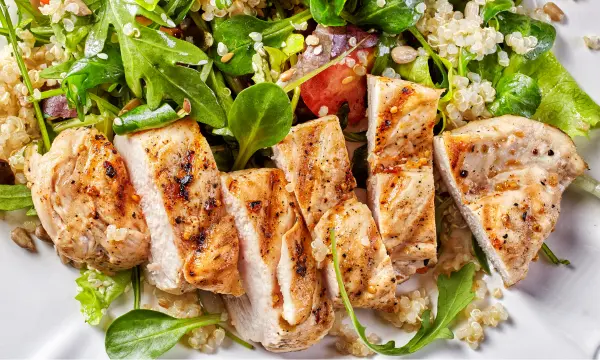
Ever found yourself enjoying a delicious bowl of chicken salad and caught your dog giving you the ultimate puppy eyes? It’s a scenario many dog owners know all too well. That look can make us wonder, “Can sharing a bit of my chicken salad with my furry best friend really be that bad?” After all, sharing is caring, right? But when it comes to our beloved dogs and the complex mix of ingredients in our human foods, it’s not always that simple.
Chicken salad is more than just chicken—it’s a mix of flavors, textures, and, let’s be honest, some of our favorite add-ins that might not always be the best for our four-legged pals. So, before we give in to those irresistible eyes, let’s dive into what makes chicken salad such a popular dish among us humans and figure out if it’s a good idea to share some with our canine companions. This journey isn’t just about feeding; it’s about loving and caring for our pets in the safest way possible. So, grab a spoon (or a paw) and let’s dig into the truth together.
Can Dogs Eat Chicken Salad?
Yes, dogs can eat chicken salad, but with some important caveats. Plain, cooked chicken is a healthy protein source for dogs, but traditional chicken salad contains a mix of ingredients that may not all be safe for canine consumption. Ingredients commonly found in chicken salad like onions, garlic, grapes, and certain nuts can be toxic to dogs. Additionally, mayonnaise, a staple in many chicken salad recipes, is high in fats and can lead to obesity and other health issues in dogs if consumed in large quantities.
If you want to share chicken salad with your dog, consider making a dog-friendly version. This means excluding harmful ingredients and sticking to plain cooked chicken, and perhaps adding some dog-safe fruits and vegetables. Always introduce new foods into your dog’s diet gradually and in moderation, and consult with your veterinarian beforehand to ensure it’s a safe choice for your pet. Remember, while sharing food with your furry friend can be a bonding experience, their health and safety should always come first.
Understanding Chicken Salad: Ingredients Breakdown

Chicken salad is a versatile and popular dish that combines several ingredients to create a flavorful and satisfying meal. The primary ingredient, cooked chicken, is often mixed with mayonnaise as a binding agent, and the salad is enhanced with various fruits, vegetables, and seasonings to add texture and flavor. The nutritional content of the chicken itself is a significant component of the salad’s overall health profile. Chicken is a lean protein source, providing essential amino acids necessary for muscle development and maintenance. It also offers vitamins and minerals such as Vitamin B6, niacin, and phosphorus, which play crucial roles in energy metabolism and bone health.
Safe Ingredients for Dogs
When considering chicken salad for dogs, it’s important to differentiate between the ingredients that are safe and those that could be harmful. Safe ingredients commonly found in chicken salad that can be shared with dogs in moderation include:
- Plain Cooked Chicken: Without added spices, cooked chicken is a healthy protein source for dogs, supporting muscle growth and repair.
- Certain Fruits: Apples (without seeds), blueberries, and bananas are safe for dogs and can provide vitamins, minerals, and fiber.
- Vegetables: Carrots, green beans, and peas are dog-friendly vegetables that offer vitamins, minerals, and fiber, which can aid in digestion.
The benefits of these ingredients for dogs extend beyond mere nutritional value. Lean proteins like chicken support a dog’s overall physical well-being, contributing to healthier muscles and a stronger immune system. Fruits and vegetables not only add variety to a dog’s diet but also supply essential vitamins and antioxidants that promote healthy skin, coat, and body functions.
It’s imperative for dog owners to ensure that any chicken salad shared with their pets does not contain ingredients harmful to dogs, such as onions, garlic, grapes, and certain nuts. Additionally, mayonnaise should be used sparingly, if at all, due to its high-fat content, which can lead to obesity and pancreatitis in dogs. Moderation is key, and introducing any new food into a dog’s diet should be done gradually to monitor for adverse reactions.
Ingredients to Avoid
When preparing food for dogs, certain ingredients commonly found in chicken salad must be avoided due to their potential toxicity. These include:
- Onions and Garlic: Both onions and garlic belong to the Allium family and are toxic to dogs. They can cause gastrointestinal irritation and could lead to red blood cell damage and anemia.
- Grapes: Grapes, and their dried form, raisins, are highly toxic to dogs and can cause acute kidney failure. Even small amounts can be very harmful.
- Certain Nuts: Nuts such as macadamia nuts are poisonous to dogs, leading to symptoms such as weakness, vomiting, hyperthermia, and tremors. Other high-fat nuts, like walnuts, can cause gastrointestinal upset and potentially pancreatitis.
The toxic effects of these ingredients can range from mild gastrointestinal upset to severe, life-threatening conditions. It is crucial for dog owners to recognize and avoid feeding their pets these harmful components.
The Mayo Dilemma: Is It Safe for Dogs?
Mayonnaise, a common ingredient in chicken salad, poses a dilemma for dog owners. While not toxic, mayonnaise is high in fats and can lead to several health issues in dogs, including obesity and pancreatitis, especially if consumed in large quantities or frequently. Given its nutritional profile, mayonnaise should be used sparingly or avoided in meals prepared for dogs. Opting for healthier alternatives or minimal use is advisable to prevent potential health complications.
Preparing a Dog-Friendly Chicken Salad
Creating a dog-friendly version of chicken salad involves omitting harmful ingredients and focusing on those that are beneficial for canine health. Here is a simple recipe:
- Ingredients:
- 1 cup cooked, boneless, and skinless chicken breast, chopped
- 1/4 cup cooked peas
- 1/4 cup cooked carrots, diced
- 1 tablespoon plain Greek yogurt (as a healthier alternative to mayonnaise)
- Instructions:
- Ensure the chicken is cooked thoroughly without any added spices or seasoning.
- Mix the cooked chicken with peas and carrots in a bowl. These vegetables should also be plain, without any added spices or seasoning.
- Add a tablespoon of plain Greek yogurt to bind the ingredients together, creating a creamy texture similar to traditional chicken salad.
- Mix well to combine.
This recipe offers a healthy alternative, focusing on ingredients that contribute to a dog’s nutritional needs. It’s important to serve this dog-friendly chicken salad in moderation and not as a replacement for regular dog food, which is specifically formulated to meet all of a dog’s nutritional requirements. Always consult with a veterinarian before introducing new foods into your dog’s diet to ensure they are suitable for your pet’s health status and dietary needs.
Signs of Food Toxicity in Dogs
When dogs ingest harmful ingredients, they can exhibit various symptoms of food toxicity. Dog owners should be vigilant for signs such as:
- Vomiting and diarrhea
- Loss of appetite
- Lethargy or weakness
- Abnormal thirst and urination
- Pale gums
- Difficulty breathing
- Seizures
If any of these symptoms appear after your dog has eaten something they shouldn’t have, it’s crucial to act immediately. Contact your veterinarian or an emergency animal hospital as soon as possible. Providing details about what your dog consumed can assist the vet in administering the appropriate treatment promptly.
Professional Advice: Consulting Your Vet
Before introducing new foods into your dog’s diet, consulting with a veterinarian is highly recommended. This precaution ensures that any dietary changes are safe and appropriate for your pet’s specific health needs and nutritional requirements. Veterinarians can offer guidance on safe human foods, suitable portion sizes, and how to incorporate these foods into your dog’s diet without disrupting their nutritional balance. Such conversations are invaluable in preventing potential health issues related to inappropriate feeding practices.
Conclusion
Throughout this article, we’ve explored the components of chicken salad and identified which ingredients are safe or harmful to dogs. We discussed the potential risks associated with certain ingredients like onions, garlic, grapes, and high-fat products like mayonnaise. Additionally, we highlighted the importance of recognizing symptoms of food toxicity and the crucial step of seeking veterinary advice before making dietary changes for your pet.
Responsible pet ownership involves understanding what foods are safe for our furry companions. By staying informed and consulting with professionals, we can ensure our dogs enjoy a varied, nutritionally balanced diet without exposing them to unnecessary risks.
FAQs
Q: Can I feed my dog chicken salad? A: Yes, but with modifications. Ensure the salad is free from harmful ingredients like onions, garlic, and grapes, and use plain, cooked chicken. Consider replacing mayonnaise with plain Greek yogurt.
Q: How much chicken salad can I give my dog? A: Treat chicken salad as an occasional treat, not a meal replacement. Small portions are key to avoid digestive upset and maintain nutritional balance.
Q: Are there any human foods that are always safe for dogs? A: While many human foods can be safe in moderation, individual responses can vary. Always consult with a veterinarian before regularly incorporating human foods into your dog’s diet.
By adhering to these guidelines and maintaining open communication with your veterinarian, you can enjoy sharing your life and sometimes your meals with your dog in the healthiest way possible.
Read More:
- Can Dogs Eat Babybel Cheese?
- Can Dogs Eat Plantain Chips Safely? Understanding the Risks and Benefits
- Can Dogs Eat French Toast? Risks and Guidelines
- Can Dogs Eat Veggie Straws? Unveiling the Canine Snacking Dilemma
- Can Dogs Eat Rotisserie Chicken? Unveiling the Truth
- Can Dogs Eat Orange Chicken? Exploring the Safety and Risks
- Can Dogs Eat Durian Safely?
- Can Dogs Eat Cheerios? Safe or Risky Snacking?
- Can Dogs Eat Couscous?
- Can Dogs Eat Banana Peppers?
- Can Dogs Eat Funyuns?
- Can Dogs Eat Acai? Exploring the Safety and Benefits
- Can Dogs Eat Tuna?
- Can Your Dog Eat Onions? Here’s Why You Should Avoid It



